Category — Miscellaneous
I USED TO BE A RABBI
I wasn’t always this religious. I used to be more religious. I first started going to shul regularly right after college. I was a paralegal at the time. I thought I was going to go to law school. I worked at this firm called O’Connor, Joseph and Welch. I got my birthday off (St. Patrick’s Day) because of O’Connor, and Mr. Joseph didn’t mind I wanted two days off for Passover. One night, in the office after-hours, I decided to answer an incoming call, trying to be helpful. I said, “O’Connor, Joseph.”
The phone caller said, “Do you know who I am? I’m Welch and I hate it when people answer the phone ‘O’Connor, Joseph’!”
I said, “Do you know who I am?”
“No.”
“Good.” I hung up and quit. Screw lawyers and their big egos. I enrolled in a non-denominational rabbinical school in Boston. I learned Hebrew; I studied Talmud; I spent a year in Israel; and all that time I was playing clarinet and saxophone. People started calling me “the jazz rabbi.” Fact: there’s an actual “jazz rabbi,” Greg Wall, who lives in Connecticut and is 10-times better than me on horns. Make that 100-times.

I eventually got a job at a Jewish nursing-home complex in Cleveland. I led services, played some jazz standards and “Hava Nagila,” and did some grief counseling. But the job wasn’t that satisfying. I wanted to engage in deeper “shrink”-style counseling. I wanted to meet up with Jews-on-the-go behind closed doors and hear all their secrets. I wanted to discuss high-stress moments: birth, life, marriage, divorce, death, tennis. (I play tennis with a rabbi. The guy kicks my ass.)
I never did become a pulpit rabbi. I applied for six synagogue jobs and got one half-baked offer — not a real pulpit. The Hillel in Norman, Oklahoma. I didn’t want to hang out with kids.
I got no decent job offers because I had too much hate in me, and that, no doubt, came across in my job interviews. For one thing, I was obsessed with Nazis at the time and wanted to stomp them. (I was about 35 years too late.) My hero was Abba Kovner, the Vilna ghetto fighter. I even attended — almost daily — the Demjanjuk trial in Cleveland, and that guy wasn’t even a Nazi, just an adjunct.
I went into real estate. That, as it turned out, was a perfect fit.
—
fiction
The “O’Connor, Joseph” anecdote comes from an actual rabbi, Joshua Skoff.
[illustration by Ralph Solonitz]
April 16, 2025 2 Comments
MY RELATIONSHIP WITH THE IRS
My latest essay in the Cleveland Plain Dealer . . .
CLEVELAND HEIGHTS, Ohio — I want to be more than just another number with the folks at the Internal Revenue Service. I write “landlord/bandleader” in the “occupation” blank on my taxes. Maybe the word “bandleader” piques somebody’s interest at the Cincinnati IRS processing center. Maybe “bandleader” conjures up Benny Goodman or Jon Batiste and makes an IRS worker’s day more interesting. Or maybe nobody looks at my returns in Cincinnati.
In the 1980s, I had an in-person audit. I went to the downtown Cleveland federal building solo, without a lawyer or accountant. I knew about taxes. My father had taught me. He didn’t teach me how to fix cars, but he did teach me how to fix taxes. My dad used to keep two sets of books — one in pencil and one in pen. He gave the government the pen version (with creative math), and he kept the pencil version (with the real numbers). My dad had grown up on Kinsman Road during the Depression and was a self-made man.
The auditor didn’t find anything wrong with my taxes. That’s how the second generation often rolls: legit numbers. The auditor gave me an $80 credit for some “supplies” I had forgotten to claim.
I think about taxes. Not just in April. Taxes are interesting.
Here are some tax pointers for this season:
Schedule C/Business income: The government looks closely at sole proprietors’ expenses. As a bandleader, how should I list the candy bars I buy for my sleep-deprived, van-driving keyboard player? For instance, are his Milky Ways a “meal”? Or are they just “maintenance”? What if my drummer wears a bright-red suit on stage? Can he deduct the suit — and the dry-cleaning costs — as a business expense? Yes. But if he wears the suit offstage, as well — in real life — then, no deduction. It’s just a suit.
Qualified Dividends: Every year, I try to remember what qualified dividends qualify for. (They qualify for lower capital-gains tax rates.)
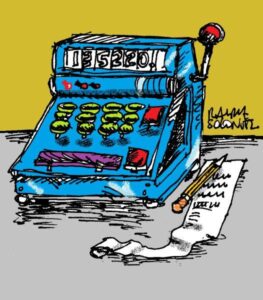
Schedule D/Capital gains and losses: In 1977, my wife-to-be, Alice, bought a couple shares of a Vanguard mutual fund. Did anyone other than Alice and Vanguard’s founder, John Bogle, own mutual funds in 1977? A smart business move — me marrying Alice.
Supplemental income and loss: Income from royalties and rental property are reported on the same Schedule E form. Why are such different sources of income on the same form? Are there many more “landlord/bandleaders” out there than I know about? I know an accordion player from Parma who owns a shopping-strip center on the West Side. I don’t know any other musicians collecting rent on the side. The most my band ever received in royalties was $45.56. That’s why I own rental property.
Depreciation/Form 4562: Buildings have different life expectancies than, say, people. Apartment buildings fully depreciate in 27½ years. Commercial buildings (like shopping strips) last 39 years. You don’t need to know that, unless you’re me.
Self-employment tax/Schedule SE: The tax on Social Security and Medicare is effectively 15.3% for a self-employed person. A salaried person pays only half that — 7.65%. That’s worth pondering about, if you’re a self-employed, small-business owner.
Maybe I’ll make somebody’s day in Cincinnati this month. I try to make my tax returns interesting. Just not too interesting.
—
(Illustration by Ralph Solonitz)
April 9, 2025 No Comments
THE BOOK THAT DOESN’T EXIST
I got an email from a literary agent: “Just read your op-ed in the New York Times and have spent the past couple hours reading everything you’ve written. Your op-eds are rooted in your personal experience, yet have universal appeal.”
Nice! Do I write a book about real estate? And then I would lecture at the Cleveland JCC Jewish Book Fair and sell product. But the writing game is so formidable, so competitive, even locally. How many more books does the world need? A thousand? Have you read Bart Wolstein’s Crossing The Road to Entrepreneurship or Maury Feren’s Wheeling and Dealing? These authors were both Clevelanders who died shortly after self-publishing. Simon’s book is about real estate and Feren’s is about selling vegetables.
Veggies. Why not. How about french fries? My son Ted was astounded in 1990 when I gave up french fries at the Fort Erie, Ontario, Burger King. I said, “No more greasy fries.” We were on our way to Toronto to see the new Blue Jays stadium.
Chicken . . . I often wound up at the KFC on Shattuck Avenue (a hangout with absolutely no countercultural status) when I hitchhiked to California in the 1970s.
KFCs are hard to find lately. Where did they all go?
A burger book? Sonic Burger, In-N-Out, Steak n Shake. What about Arby’s — the non-burger? I liked Arby’s roast beef sandwich with Arby’s Sauce. And add a Jamocha shake. In Cleveland there was an Arby’s knock-off, Beef Corral (a k a Barf Corral), owned by the Modzelewski brothers, former Browns players.
When my daughter Lucy was little, she designed a coat-of-arms for me that read “No Fries.” That’s my legacy unless I crank out a real estate book.
The real estate book . . . in 2016 I wrote a proposal, outline and sample chapter, and my lit agent got no takers for the project. Here are some sample chapter titles from the proposal: “Build an Ark: this place is flooding,” “Booms, bubbles and cash flow,” “We have standards,” “Job #1: get the money in the bank,” “Gotta serve somebody,” “Pull the trigger,” “Never on Sunday (because the tradesmen are on their boats in Lake Erie),” “Quasi-Legal Advice,” “Renting the American Dream,” “Jazz and Real Estate.”
I wouldn’t entirely rule it out, the real estate book, just yet. Or some sort of book. AKs like me like to self-publish about french fries, burgers, real estate, whatever.
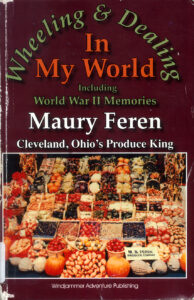
March 26, 2025 5 Comments
BURY ME AT HORSESHOE LAKE
–A FAREWELL TO AN OLD FRIEND
(This essay was in the Cleveland Plain Dealer on Sunday.)
Even if you’re rich, you can’t always get what you want. For example, you can’t buy Horseshoe Lake, which straddles Shaker Heights and Cleveland Heights. An assortment of neighborhood high-rollers, medium-rollers and salt-of-the-earth ex-hippies tried to save Horseshoe Lake. These lake-lovers funded lawsuits against the cities of Shaker Heights, Cleveland Heights and the Northeast Ohio Regional Sewer District.
We fought the law and the law won.
I was a founder of Friends of Horseshoe Lake. We paid for the lawsuits and an engineer’s evaluation of the defunct dam. We wrangled a couple thousand signatures on a petition to save the lake, but not enough people cared.

Horseshoe Lake when it was a lake. (Photo by Lucy Stratton)
The Sewer District is going to turn the former lake — which was drained almost six years ago — into a boardwalk and nature preserve. They plan to rip down some trees and put in a paved service road. Is the road a homage to the never-built Clark Freeway that the county wanted to put through the Shaker Lakes area in the 1960s?
I have a friend who lives a mile from Horseshoe Lake. He lives near Lower Shaker Lake. He said, “I have my lake. I don’t care about yours.” The notion of NIMBY (Not in my Backyard) doesn’t travel well; you get about a mile from the Horseshoe Lake, and not that many people get worked up about its disappearance.
Granted, there are more pressing issues than Horseshoe Lake, like crime, housing matters and leaf blowers. But how many boardwalks and little playgrounds do we need? We already have the Nature Center at Shaker Lakes. Even a “lake feature” is lacking at the upcoming Horseshoe park. The Sewer Board is spending $28.7 million – up from the original $14 million – and that doesn’t include another $8.6 million for amenities, which supposedly Shaker Heights and somewhat-financially-strapped Cleveland Heights are expected to cover.
The Sewer District and the Ohio Department of Natural Resources claim the goal is to prevent a flood disaster downstream in University Circle. Nobody has died from a flood there, but you never know. Every hundred years a person might die in a storm under the Cedar Road Rapid tracks. And I might get hit by a bus tomorrow.
I live about a football-field away from the late great Horseshoe Lake. I used to live several miles away and visited often. Horseshoe Lake was calming. It was blue and serene. I couldn’t bike out to Lake Erie that often; that’s a six-mile schlep from Cleveland Heights. The Metroparks aren’t too close to the Heights either. Speaking of which, our lawyer talked with Metroparks’ people, and the park system wasn’t highly motivated to save Horseshoe Lake. On a stroll around the Heights, I ran into retired Cleveland city planner Bob Brown. He said he thought the Sewer District’s plan for the Horseshoe area “doesn’t look so horrible.” I hope Bob is right.
In winters I used to walk across the frozen lake. There were signs posted against it, but the water wasn’t that deep, and I figured if I fell into the lake. it would be a classy exit. Now what can I fall into? A playground amenity? No, thanks.
March 4, 2025 No Comments
WHAT’S YOUR TIME WORTH?
My time is worth $107.98 an hour.
I lost two harmonicas at a gig yesterday. I never lose anything. And I had bragged about finding my wife’s Visa card, which had been missing for a day. Alice considered calling the 800-number and canceling. No, Alice, that’s nightmare city. Alice walked in the snow for four miles looking for the Visa card, which she thought might have fallen out of her pocket while biking.
She didn’t find the card. I found it in the bedroom under a bed. I don’t know how the card got there. I always use a flashlight to search for missing stuff. That’s my trick; the flashlight helps me focus.
My harmonicas were in a gig bag, which I hadn’t fully zipped. I think the harps wound up in the snow in the parking lot at a nursing home, where I had a gig last night. I didn’t “hear” the harps fall in the snow. The last time I lost something was a ski cap — also in the snow.
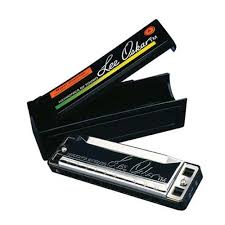
I think I’ll order two harps on Amazon, $107.98 total. The harmonicas will arrive tomorrow. I don’t feel like driving 16 minutes each way to the nursing home to look for the harps. That’s 12 miles round-trip — a significant haul by Cleveland standards. And then another half hour looking for the harps.
I’ve called the nursing home. So far, nothing.
My two choices: 1) pay $108 for two harps, or 2) drive 32 minutes, plus spend time looking for the harps in the snow. And don’t forget the depreciation on my car.
(“Yesterday” was actually Jan. 16, 2025. I bought the harps.)
February 12, 2025 1 Comment
A LONG MOVIE, ONE LESS TENANT
AND A GUITAR
My latest Cleveland Plain Dealer essay . . .
A LONG MOVIE, ONE LESS TENANT AND A GUITAR
CLEVELAND HEIGHTS, Ohio — The new Bob Dylan movie, “A Complete Unknown,” is too long and a bit too “unknown” — too much about Dylan-from-nowhere. And it’s two hours and 20 minutes, with 40 songs. I like biopics from somewhere — and shorter. How about Dylan’s year at the Sammy fraternity house at the University of Minnesota, followed by his odyssey to New York’s Greenwich Village? That would have been better.
Maybe I’m not enough of a Dylan aficionado. I’m a fan, but not a fanatic. Irwin Weinberger — who used to play in my klezmer band — is a super-fan. Irwin has been to Duluth and eaten at Zimmy’s Deli in Hibbing, Minnesota. Irwin loved every bit of the movie. When Irwin and the klezmer band played weddings and bar mitzvahs, Irwin would often — by request from listeners — veer from the klezmer music into Dylan, singing “Subterranean Homesick Blues” and “Tangled Up in the Blue” without a cheat sheet. The trick was getting Irwin to stop after two verses.
A tenant left his guitar behind. (My day job is managing apartment buildings in Lakewood.) The tenant said he was going home to Kentucky, taking only what could fit in his car. He said he wasn’t renting a U-Haul because he didn’t have a valid driver’s license. The manager at the building told me the suite was dead-bolted from the inside. I said, “Well, if the place starts to smell, let me know.” Every so often a tenant dies in a suite.
I tried to open the door with the regular key. That, surprisingly, worked. Locks can be finicky, particularly in old Lakewood buildings; you’re never sure you’re getting in until you’re actually in. The suite was above an Indian restaurant and a butcher shop on Detroit Avenue. I found a wooden chair, the guitar, some heavy-metal CDs, a book of Shakespeare plays and Charles Bukowski’s “Notes of a Dirty Old Man.” The guitar was a Chinese Martin knock-off with a solid-body case. The case, alone, was worth something. I’ll give the guitar back to the tenant if he returns, but I doubt he will. I also got some postage stamps from the apartment. Nobody wants stamps except me, apparently. I pay a lot of my bills by mail. I’m 74.
When I was 26 . . .
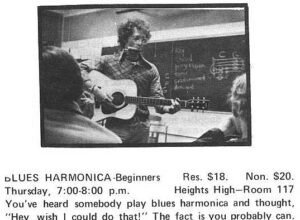
Years ago, I learned a few guitar chords, and now I want to try again. How about, “Dear Landlord”? … “Dear landlord, please don’t put a price on my soul.” Life is complicated. I hunched over the guitar, pressed my fingers to the steel strings, and strummed hard. An acoustic guitar is probably the least ergonomically friendly instrument around. I’m not a 20-year-old made out of rubber.
Dylan mostly plays piano these days. I can see why. He’s 83.
Maybe a tenant will leave me a piano. But please, not a rotted-out 400-pound upright with worn-out strings, dampers and hammers. I “inherited” that piano from a tenant in September. It cost me $500 to junk.
January 15, 2025 3 Comments
THE BEST FAMILY TRIP
OF ALL TIME
Teddy, then 11, insisted we go to Disney World. He wasn’t abiding his mother’s posturing about how Disney World would deliver no “sense of mastery” to him. Let’s go!
This would be Ted’s second Disney trip. He had been to Orlando five years previously with his grandmother, sister and me.
The repeat trip turned out to be the greatest family trip of all time. Ted and his siblings, Lucy and Jack, went absolutely nuts for Figment, Miss Piggy and the Ninja Turtles. And Epcot was cool. The kids spent some time on the floor there — Lucy on top of Jack in the Moroccan restaurant lobby, putting him in a full-nelson.
Ted had researched the vacation, using Unofficial Guide to Disney World. (This was 1993, pre-Web.) Teddy devised our personalized Disney itinerary. We got on popular rides at odd hours and walked in counter-intuitive directions. This was before priority passes and VIP lines. This was when America was Sweden.
Prior to the Disney trips, I had been a snob about amusement parks. If an amusement park was new-ish, we weren’t going. It had to be old and rickety. We had gone to Memphis (Avenue) Kiddie Park, Geneva on the Lake, Kennywood in Pittsburgh, and Conneaut Lake Park in Pennsylvania. Conneaut was the best; it had a carnie booth of caged chickens playing tic-tac-toe. You bought corn kernels from a gumball machine and fed the kernels to the chickens, to motivate them to play tic-tac-toe. The contraption was like out of a B.F. Skinner behavioral-science experiment.
Conneaut closed in 2010. Luna Park closed in 1929. (I didn’t make it to that one.) Euclid Beach Park — the classic Cleveland amusement park — closed in 1969. Geauga Lake, for some reason that was never on my radar.
Disney forever.
—
Teddy’s itinerary . . . This is just the first page (the next two pages are lost to history). 1993. Typed on a Compaq x386. WordPerfect 3.1.
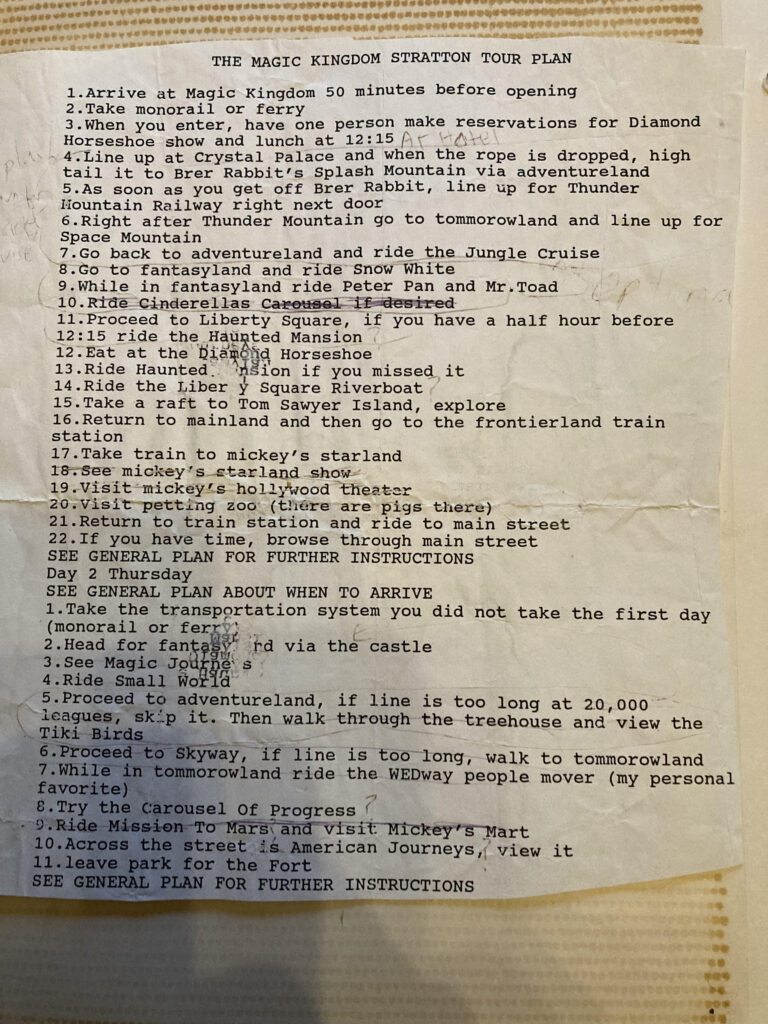
January 8, 2025 6 Comments
MILLIONS OF CATHOLICS
AND SOME JEWS
When my kids were young, every Chanukah I would take them to the various Jewish bookstores around town to buy decorations and Chanukah books and toys, just so they would get used to these places. At Frank’s Hebrew Bookstore, I thought I was in Poland: tallisim (prayer shawls), spice boxes, yarmulkes. A photo of Koufax on the wall — that would have helped.
Also, I drove my kids to the Christmas lights at General Electric’s Nela Park. That was a family tradition, started by my parents in the 1950s. Why not? Lights is lights.
Yiddishe Cup used to play holiday parties at the Cleveland Plain Dealer. We would stroll table to table. Just about everybody asked for Christmas carols.
Hey, I didn’t start Yiddishe Cup to play “Silent Night.” I said no to all Christmas requests. We would play “Hava Nagila” or tunes from Fiddler on the Roof, if asked. Dick Feagler, a renowned Plain Dealer columnist, gave us the thumbs-up for staying Jewish. Dick apparently liked our Full Cleveland approach. (Full Cleveland meant polka, klez, bandura, tamburitza, salsa. All good.) No rock for Dick.
After strolling to about 10 tables, I cracked; I couldn’t take any more “What? You don’t do Christmas songs?” We played Jose Feliciano’s “Feliz Navidad.” Christmas in Spanish was OK.
—
My family went to KlezKamp in the Catskills during Christmas week for more than a decade. At first I couldn’t get my wife, Alice, to go. We had young kids and she didn’t want to schlep them. One year I took the two oldest kids and went without her. I spent a lot of time in the hotel game room and swimming pool that year. That chemical vat, a k a pool, was only slightly larger than a half dollar, and you had to coat yourself with 100-proof skin cream or get a rash.
The kids and I went to New York City afterward. My daughter, Lucy, then 5, made me carry her everywhere. We didn’t get too far. We went to Popeye’s on Times Square for dinner.
When we got back to Cleveland, Alice said at the doorway, “The kids look anemic!”
Alice, we had beans and rice and lemonade at Popeye’s! (The kids hadn’t been too crazy about the borscht and herring at KlezKamp.)
Alice has never trusted me with food, or childrearing for that matter.
The following year Alice came with us to Klezkamp. All five of us. Alice was a folk dancer and exercise nut; however, Jews at klezmer conventions are not typically exercise freaks. Alice found a nearby indoor tennis court which was so dusty the balls turned black after one set. It was like playing in a parking garage. We went skiing on Christmas. I thought the slopes would be empty, but no, a lot of Asians and Jews from New York City were there.
We snuck over to The Pines resort for ice skating. That place looked like a staging area for a Borscht Belt revival movie. We had a good time checking out trivia contests in the lobby. I’ve got nothing against middle-class Jews. I am one.
My family kept going back to KlezKamp every Christmas. Ikh khulem fun a vaysn nitl. (I’m dreaming of a white Christmas.) And every year Alice would complain: “I can’t believe we’re going to KlezKamp again!”

Jack Stratton, Merlin Shepherd (kneeling) and Lucy Stratton. KlezKamp 1993.
Finally, after 12 years, the brainwashing was complete; the kids knew more Yiddish than oy vey and farklempt, and they knew a lot about klezmer music, and Alice could have, by then, taught the dance classes. And I had met all the old klez guys: Max Epstein, Felix Fibich, Danny Rubenstein, Velvel Pasternak. Paul Pincus, Leon Schwartz, Ray Musiker, Ben Bazyler, Sid Beckerman, German Goldenshteyn, Howie Leess, Elaine Hoffman Watts.
They’re probably all dead now.
I paid my dues.
—
“Merry Christmas” is OK with me. Beats “Happy Holidays.” I once went to a West Side house for Christmas and about 12 Ukrainian girls walked in and caroled us. And they were in full regalia. That was my most Christmas-y experience – until this year.
I went to Mass yesterday. Midnight Mass (which was actually at 4 pm for AKs like me and families with young kids). Joint was jumping. St. Ann Church, Cleveland Heights. A field trip. Park Synagogue’s senior rabbi, Joshua Skoff, led the outing.
The priest prayed for the well-being of the pope, Cleveland’s bishop, etcetera, on down to the “millions of Catholics” throughout the world. Millions — that word hit me. We Jews don’t bandy millions around lightly. That’s some big tent those Catholics have.
I miss KlezKamp. I like the small-ball game of Judaism. Only 15.8 million of us, and we all know each other!
December 25, 2024 3 Comments
TWO OLD COPS
AND ONE YOUNG MAN
The cops had 66% retirement pensions and hung around McDonald’s on Lake Shore Boulevard in North Collinwood. Mostly Slovenians. They were hard-pressed to find a Jew — besides me — to share stories with. These cops had worked with Jews back when Jews lived in the city.
Bill Tofant, a retired cop, said he had worked out every day at the “Yiddishe Meat Cutters Union,” a k a the YMCA. He said, “I can still run a mile at age 73 and can hold my own in fisticuffs, and I can turn my head to see if traffic is coming.”
Tofant said my Great Uncle Itchy Seiger would throw his arms around Bill every time he came into Seiger’s deli on East 118th Street and Kinsman Road. “I couldn’t even spend a nickel in Seiger’s. I had corned beef, turkey, you name it.”
 Tofant and fellow retried policeman Ray Lonchar ignored the sign in McDonald’s dining area: 30 Minute Time Limit While Consuming Food. The manager must enforce these rules. Your cooperation is appreciated. Tofant and Lonchar had known Botnick the pawnbroker — “a good sharp yidl.” Botnick got shot and killed in 1981 at his pawnshop at East 59th Street and Euclid Avenue. I knew Botnick. My dad used to play tennis with Botnick. Lonchar said, “That was done by a jig. Three colored guys went in back and they stuck the place up, and the cameras were just installed. One guy had a horse pistol, yea-long, it stuck out like a sore thumb. It was a military weapon. They picked him up in Rolla, Missouri.”
Tofant and fellow retried policeman Ray Lonchar ignored the sign in McDonald’s dining area: 30 Minute Time Limit While Consuming Food. The manager must enforce these rules. Your cooperation is appreciated. Tofant and Lonchar had known Botnick the pawnbroker — “a good sharp yidl.” Botnick got shot and killed in 1981 at his pawnshop at East 59th Street and Euclid Avenue. I knew Botnick. My dad used to play tennis with Botnick. Lonchar said, “That was done by a jig. Three colored guys went in back and they stuck the place up, and the cameras were just installed. One guy had a horse pistol, yea-long, it stuck out like a sore thumb. It was a military weapon. They picked him up in Rolla, Missouri.”
There had been another Jewish pawnbroker, at East 79th Street and Hough Avenue. “He would buy a stove [gun] that was red hot and smile,” Lonchar said.
There was Uncle Ben, too, at Woodland Avenue and East 55th Street. “He was kind of lax with his records, but he was good to our pawn unit,” Lonchar said.
When the cops ran out of Jew-lore, they segued to Italians, or even Lithuanians. Blacks — nope. “Shondor Birns [a Jewish gangster] — he had the colored in line,” Lonchar said. Birns had controlled the city’s numbers racket.
I patronized the Lake Shore Boulevard McD’s in the mid-1980s, during the dying days of white ethnicity. Back when cars had bumper stickers like “Thank God I’m Slovenian,” “Thank God I’m Irish” and “Thank God I’m Polish.” Funny, I never saw a “Thank God I’m Jewish.”
The Lits (The Lithuanians) . . . They lived near Our Lady of Perpetual Help Church — very close to McDonald’s. Lonchar said, “DPs — I don’t care what nationally they are — they’ll eat nothing but soup for 20 years, three times a day, and save their money, and all of a sudden they buy apartment buildings, invest, and they start rolling. They found out that the streets of America didn’t have gold in them. They had to work for it.”
The Italians . . . with all their “goddamn Italian bullshit.” The Italians lived near Holy Redeemer Church, approximately two miles from McDonald’s. Tofant said, “One thing about Italians, they stick together. If you’re Italian, you’re better than me. You might be the dumbest SOB on two feet, a goddamn dunderhead, but just because you’re Italian, you’re it. The Irish get the way, too, around St. Patrick’s Day.”
The Poles . . . Tofant said, “There was one Polack, Frankie Schant, a safecracker. He bit the cheese and left an imprint. He bit the cheese at the grocery store and they matched his teeth marks. At Pick-N-Pay. And there was this South Side Polack who cut a wire, it was live, and he died.”
Slovenians . . . the best for last, here. Take Charlie Broeckel. (He might not have been Slovenian but the Slovenians claimed him.) Tofant said, “He had class. He went out to Laguna Beach, California, and did a bank heist there. Burned through seven mill worth of shit and negotiable papers. I knew him when he was 10 years old. He was a runner. He always found his way out. And you know what, his mother held a very respectable job. She was beyond reproach, nothing like a stumblebum or anything like that. They lived at 8815 St. Clair.”
Nail a historical plaque to that door!
—
I was doing research — and legwork — for a cop novel back then. (Unpublished novel.) I’ll briefly quote the manuscript, if I can find it. Found . . .
“Stan Zupancic had a glazed turquoise ashtray contoured in the shape of a .44 magnum. His pencil holder was made from World War II antitank shells, and he used a bowie knife to open his mail. A young man, with a growth of brown curly hair that looked like a dead shrub, sat on the other side of the desk.”
December 11, 2024 3 Comments
“GENOCIDE” — WHAT DOES IT MEAN?
This essay was in the Cleveland Plain Dealer last week . . .
“Genocide” — what does it mean?
CLEVELAND HEIGHTS, Ohio — Sean Martin, the assistant curator for Jewish history at the Western Reserve Historical Society, once taught an online course called “Comparative Genocide.” The course was offered through Gratz College, in Philadelphia. I said to Sean, “I think Don DeLillo wrote about Hitler Studies in a novel. That was a novel. ‘Comparative Genocide,’ is that a real course?” It was. (This was 13 years ago.) Now it’s called “Genocide in the Modern World.”
“Genocide” – the word – what does it mean?
Pope Francis, in his new book, says that Israel’s retaliation in Gaza should be investigated to determine if it meets the legal definition of genocide. Patricia Heaton — a former Clevelander, Catholic, and TV actor – said the pope should “look up the definition of genocide.”
Heaton also said on “Elizabeth Vargas Reports” that, “Israel is trying to find the hostages, release them, take out the Hamas leaders and end the war.” She said, “It’s time for every American, and in particular Christians, to stand up and make sure our representatives know they have to help Israel.”

(Illustration by Ralph Solonitz)
The word “genocide” was coined by a Polish Jewish lawyer, Raphael Lemkin, in 1944. He ingeniously combined the Greek “genos” (tribe) and Latin “cide” (killing). Genocide, he wrote, is the slaughter and attempted elimination of a people, a culture, an ethnicity.
Killing a lot of people – is that genocide? It’s most often war. For instance, America bombed Germany. That was war. Germany sidetracked its military effort specifically to gas Jews-for-being-Jews. That was genocide.
I visited an old college friend, John, in Chicago. His front door had a poster, “Stop the Genocide in Gaza.” We talked about old times. Toward the end of our what’s-up conversation, I said, “What’s with the sign?” He had gotten it from the radical group Jewish Voices for Peace, so the sign was “kosher,” John said. John isn’t Jewish.
One question, John: If the Israelis are committing genocide, why are there some 7 million Palestinians in the Middle East today, including more than 2 million in Gaza alone? There had been about 1.2 million Palestinians in 1947. Israel is doing a lousy job of committing genocide, apparently. I didn’t mention any of this to John because I was timid.
Earlier this month, I finally spoke up — at a Cuyahoga County Council meeting downtown. I spoke during the “public comment” portion. Granted, speaking to 11 somewhat-bored council members was a lot less fraught than telling an old friend where to go. The council members probably would have preferred hearing about countywide childhood mental-health issues or summer youth-employment programs, but a lot of commenters wanted to talk Israel/Gaza. I said to the council, “Some people think there are three kinds of Jews: Reform, Conservative and Orthodox. Wrong. There are these three types: American Jews, Israeli Jews, and victims of the Holocaust. Six million to 7 million each. We don’t want the Jews of Israel to be wiped out.”
The county has invested $16 million in Israel Bonds. (The bonds aren’t a gift. The county gets the money back plus interest.) Some anti-Israel speakers used the word “genocide.” A woman talked about local issues – and even used the word “genocide.” She said, “Think about the genocide here in Cleveland with the homelessness.”
Hamas, Hezbollah and Iran have repeatedly said – and acted on – their desire to eliminate Israel — the one Jewish state, home to half the Jews in the world.
That’s genocide. Update your dictionary.
December 4, 2024 3 Comments
BLOG QUIZ
“I’ve read every word of your blog,” a musician told me.
Hooray for him. I wrote every word.
At shul, a reader told me, “You found your subject. Toby.”
No, you did. I’ve had Toby (my father) on the brain for decades.

Toby Stratton, 1938. OSU graduation.
A woman told me, “I look forward to your Wednesday-morning posts. I don’t do comments.”
My comment: 95% of readers don’t do comments. They’re above that.
Several readers claim they’ve read every word of this blog. OK, prove it:
1. What was the name of Yiddishe Cup before it was Yiddishe Cup? A. Wild Horses B. Funk a Deli C. Kosher Spears.
2. Who invented klezmer? A. The Jews B. The Klezmorim (Berkeley) C. Henry Sapoznik.
3. What was Toby Stratton’s legal first name? A. Toby B. Theodore C. Wayne.
4. What did Toby want buried with him in his coffin? A. Chlortrimeton allergy pills B. An Indian-head nickel C. The Wall Street Journal.
5. How do Yiddishe Cup musicians refer to their bandleader? A. Ding-a-ling B. Pissant C. Sir.
6. Yiddishe Cup has played: A. Brooklyn, N.Y. B. Brooklyn, Ohio C. Neither.
7. A landlord’s biggest problem is: A. water leaks B. bugs C. tenants.
8. Toby’s favorite sport was: A. tennis B. counting Jews in Chinese restaurants C. depositing rent checks.
9. Most often a working musician’s main interest is: A. music B. the food situation.
10. Does Jack Stratton play with Yiddishe Cup? A. Depends on what decade you’re talking about.
11. Which group can you make fun of in Cleveland?: A. Slovenians B. Blacks C. Orthodox Jews D. Slovenians.
12. Which is the hardest to find? A. A plumber B. roofer C. electrician D. door-buzzer guy.
October 9, 2024 No Comments
FALL GUY
I was putting away my tenor sax. I was seated. The wooden chair leg snapped and I fell into a bunch of flower bouquets stage-side. Wet flowers. Luckily I had on a heavy tux jacket. I landed on my shoulder. I wore the heavy tux because it was cold out (earlier this month); the wedding gig was in a tent with no heat. Good news. I didn’t injured anything.
When an old person tumbles, it’s newsworthy, at least to the tumbler. I see falls occasionally on gigs – old people doing the hora and tripping. Once a young woman tripped and broke her ankle. She was scheduled to run a marathon. It’s all about the shoes.

Seven steps in Michigan. (Camp Michigania)
Seven steps in Michigan . . . I was walking down some steps in Michigan last month. The stairs were outside, it was dark and everybody was saying “Look at the blue moon — the super moon!” I did, and I went flying. I had just seen the Olympics on TV; maybe that’s why, in mid-air, I decided to “plant” like a gymnast and then roll on my right shoulder. I had on a polar fleece jacket. Again, nothing happened. 2-for-2.
A friend sprained her ankle hiking in Colorado on vacation. An acquaintance broke her hip in Cuba on a trip (literally); she wound up staying down there a couple extra weeks. In Mexico I fell off a mountain bike and injured my ribs. That was five years ago. I’d like to blank that out. I bruised my ribs. Not broken, not fractured, just bruised. At least I think I was just bruised; I never got an X-ray to find out. I could breathe. It was a little difficult to play the clarinet but I could.
Roll with it. Hope your luck holds.
—
Yiddishe Cup plays the University Heights Fall Fest 12-1 pm this Sunday (Aug. 29) at Walter Stinson Park, 2301 Fenwick Rd, University Heights, Ohio. The event is free.
September 25, 2024 1 Comment
THE STOMACH JEW
English novelist Howard Jacobson described himself as a “stomach Jew” in an interview. He’s a bagel-and lox guy. He doesn’t go to synagogue. He’s a stomach Jew. How about a lung Jew? A vein Jew?
I bumped into Jacobson in London. Former Yidd-Cupper Irwin Weinberger and I ran into him on the street. Irwin and I were over in Londres in 2016. Irwin feigned a British accent while we busked. We did “When I’m 64.” Nothing much happened when we played it. London is big; people ignore you.

Howard Jacobson
I recognized Jacobson’s punim from his book dust- jacket head shots. He won the Booker Prize in 2010. I said to him, “Are you the English Philip Roth?” I couldn’t remember his actual name when I bumped into him. Jacobson acknowledged he was, in fact, the English Philip Roth. Some American book reviewers call him that.
Irwin and I told him we play klezmer and some Catskill’s comedy tunes, and Jacobson said, “Like ‘Bar Mitzvah Ranch?’” (Mickey Katz used to dress up as a Bar Mitzvah rancher in cowboy boots and chaps.) Katz, the musician, was from Cleveland. Jacobson said, “You play for ranchers?” Ohio is ranches.
Goodbye. Jacobson had places to go. A half hour later we ran into him again. What are the chances of that in London? He was with his wife. I should have asked about the “stomach Jew” quote. In America we say “deli Jew.” My dad, Toby, was the king of deli Jews — borscht, halvah, corned beef. He grew up in a deli.
I was once a bagel Jew. I’d go to Bialy’s in University Heights, buy 15 bagels, eat two bagels right away, and drive to my mother’s and give her three, and take home 10. I was more than a bagel Jew. I was a bagel. Next time I run into Jacobson we’ll talk bagels.
September 18, 2024 1 Comment
STAMPS ARE OUT
Some of my friends and relatives are extremely cheap. I know two people who reuse dental floss. I’m not like that, but the one thing I do like to save money on is postage stamps. I won’t use two first-class stamps on a two-ounce letter. I go with one first-class, 73-cent ‘forever’ stamp, plus one “additional-ounce” forever stamp, 24 cents.
I’m a former philatelist. I have a U.N. souvenir sheet from 1965. United Nations stamps were a hot item back then. I got the souvenir sheet as a gift for my Confirmation. It cost my parents $75 ($749 in today’s dollars). The sheet is worthless now. U.N. stamps tanked just like the org.
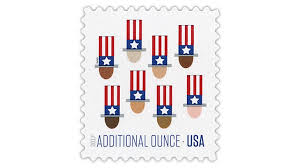 I made a trip to the P.O. to buy “additional ounce” stamps. Also, I decided to get some extra 2-centers, too. Yes, I use Quickbooks and Venmo, but I use the USPS as well. The P.O. clerk handed me the 2-centers and informed me she had no “additional ounce” stamps.
I made a trip to the P.O. to buy “additional ounce” stamps. Also, I decided to get some extra 2-centers, too. Yes, I use Quickbooks and Venmo, but I use the USPS as well. The P.O. clerk handed me the 2-centers and informed me she had no “additional ounce” stamps.
“Do you sell milk?” I said. “This is a post office. You sell stamps! You don’t have stamps? Where can I get the stamps?”
She said try another branch.
I left. I’m not doing any more runs to the P.O. for “additional ounce” stamps. I’ll simply put two first-class stamps on two-ounce mail from now on. So it’ll cost me an extra 49 cents each time. (Maybe my son Ted will get me some additional-ounce stamps if he reads this.) I’ll be spending about $10 more per year by not using the additional-ounce stamp.
—
By the way, I didn’t say “Do you sell milk?” at the P.O. I dreamt that retort up in the P.O. parking lot, post-visit. But the dialogue looks good here, in writing, so pretend I said it.
September 11, 2024 3 Comments
I’M THROWING OUT THESE BOOKS
Every two years I prune my library. My wife insists. If you want any of these books (see list below), stop by my tree lawn before Tuesday — garbage day.

Glenn E. Schembechler
Bowl Game Disasters by Glenn E. Schembechler
Stupid Bastard: The Life of Harry Purim by Meier Meier
10 Days to a Hairless Body by Anne Greune
The Whim of Grit by Malcolm Bolivia
So You Want to Be Jewish? by Miriam Roth
The Story of the Harlem Cooperative Bakery by Rose Lee Pak
Cover Your Lawn with Green Sheet Metal by Jennifer Budzowski
Throw Away Your Truss by Jon Kades
So You Want to Dance, Act, and Play the Clarinet! by Pippi
Kreplach in the Congo by Reb Yellen
Amusing Car Sales by Sid Halpern
Spelling Made EZ by Jaimi Michalczyk
The Peacock Invasion by Morry Corriendo
Good Riddance, Chancres! by Rodney Benton
Cryptic Tokens of Praise (poetry) by Del Spitzer
Whoring in Milan, Rome and Naples by “Lilly”
Goldwater by William E. Miller
The Streets of San Francisco and Richmond, California by Cindy L. Barbour
The Man: Susan B. Anthony by Janice Kugelman-Sugerman
Milk Will Kill You by Len Saltzberg, M.D.
Pet Insurance for Dummies by Buster
Guess Your Friends’ Net Worth by James Kirston
Barbados: Our Key Ally by Cecil Hernandez
Thinking is the New Smoking by Amos The Bison
No Mo’ Boca: A Baby Boomer’s Guide to Retirement by Esther Palevsky
Cuckoos and Grosbeaks by Nancy Dubick
Carolina: The New Promised Land by Irv Weinberg
Visceral Robotics by Suellen Montague
Garbage: A History of Waste Management Inc. by Lake Koonce-Katz
September 4, 2024 5 Comments
CONCERT FOR ISRAEL
There are three types of Jews. No, not Reform, Conservative and Orthodox. Try American, Israeli and victims of the Holocaust. Each about a third.
The Israeli contingent is top of mind right now, with Iran and its proxies wanting to turn Israel into dead Jews. In America — in Cleveland — what is a Jew to do? I called my friend Shelly Gordon, who moved to Israel after college to become a tennis pro. He played for Ohio State. He still gripes about my childhood private lessons; I violated the South Euclid Tennis Court Oath, which was Don’t Be a Tennis Snob. Shelly‘s strokes are bad but he’s good. He never took a private lesson.
He said, “Ninety percent of Israel is business as usual — going about our lives. I play tennis.” Shelly is a sports nut. He follows the Browns, Buckeye, Cavs and Guardians. In Israel he logs on at 3 a.m. to catch Cleveland sports scores. He once had a yarmulke that read “Cleveland Cavaliers.” On his off days, he visits his children and grandchildren and hopes they don’t get killed.
What‘s a Cleveland Jew to do? Here’s an option. Yiddishe Cup plays a benefit concert for Magen David Adom — the Israeli emergency blood and medical services operation.
The concert is 7 p.m. Wednesday, Aug. 28, at the outdoor, covered Wain Pavilion, Park Synagogue, 27500 Shaker Blvd, Pepper Pike, Ohio.
Magen David Adom is like an Israeli Red Cross. The concert is free but donations are encouraged. Money from the concert — along with gelt from other Cleveland-area contributors — will go toward buying an ambulance.
Yiddishe Cup will play songs from Holocaust-haunted Eastern Europe, America, and songs from Holocaust-avoiding Israel.
Cleveland stands (and sits) with Israel. There are chairs.

August 21, 2024 2 Comments
GOING FULL-ESPAÑOL
When I traveled in Latin America in the early 1970s, I was constantly on the lookout for American culture. American culture, not Latin American culture. I was homesick. In Mexico City I heard Kurt Vonnegut give a lecture. I went to American movies. I remember Paper Moon. I attended a Charlie Byrd concert in Bogota. Bryd — a jazz guitarist — had played with Stan Getz. Byrd introduced his band in Spanish, saying “en la batería” for “on the drums” and “en el bajo“ for “on the bass.” Byrd connected linguistically and I admired that. His concert was part of a U.S. State Department tour.
I did an Charlie Byrd imitation last week. I introduced Vulfpeck in Spanish at a concert in Madrid. I spoke Spanish to 3,500 Spaniards!
https://www.youtube.com/watch?v=8P-e3bGDSak

Outdoor concert, Vulfpeck, Madrid, 7/21/24.
I told my son Jack that my intro would take a minute. It took 4:19 minutes. While I blabbed on, Jack became slightly agitated stage-left, in the wings. He signaled me to speed it up but I didn’t see him.
I hate it when a musician says he’ll do a minute and then solos for two minutes. In my defense, re Madrid, some of my stage-hogging time consisted of applause and laughter.
Here’s a translated joke from my intro: “Ladies and gentlemen, I was so excited when I first heard Vulfpeck was going to play Madrid that I immediately went on the internet and checked out the lineup for tonight’s show — Apertura de puertas 7:30 pm, Judith Hill 8:45 pm, Vulfpeck 10:15 pm. I wondered, What is this band Apertura de Puertas?”
“Apertura de puertas” means “Doors open.”
Maybe you had to be there.
—
I had a terrific Spanish teacher, Judith Worth, at Brush High. She wrote me in 1980: “Bert, I was glad to have news of all your classmates, and to know that they are doing well — and have used their Spanish. I was very attached to all of you, as if you were my own kids.” I’ll send her this post. (According to the internet, she’s 87 and living near Austin. I last talked to Mrs. Worth four years ago.)

Charles F. Brush High yearbook, 1968.
July 31, 2024 3 Comments
IF YOU’RE LOUD, YOU’RE LOVED
When Trombone Shorty played last month at Cain Park, in Cleveland Heights, he was loud. I didn’t take out a decibel reader but the show was ear-splitting. And I was wearing earplugs. Trombone Shorty frenetically ran around saying, “Let’s get crazy!” and “How you feeling? Feeling Good!” He played mostly super-loud funk and not much New Orleans brass-band music.

Trombone Shorty
Why did I go? Because I like the name “Trombone Shorty.” If Shorty had been Joe Smith, I probably wouldn’t have gone. [What’s Shorty’s real name? . . . Troy Andrews.] I like New Orleans brass-band jazz. I don’t like rock-level blasting. Two guitars, electric bass, loud drums, no sousaphone.
Eleven years ago I was in New Orleans on vacation, and I sat in with some pro musicians on Jackson Square. Trumpeter Kenny Terry had a slick ensemble which entertained tourists on the square. I went back to my hotel room, got my axe, and — heads-up, Kenny — here I am!
Terry said, “Where you from — Kansas?” Close enough. He announced to the crowd: “Ladies and gentlemen, we have a special guest from Cleveland!”
Cleveland was good business for Terry; eyeballs focused on the white guy with the clarinet. Tip-jar activity increased. There were about 100 people.
We did a Bb blues. I didn’t project enough; I had a thin sound, at least for outdoors. Kenny said, “You got to play with some balls!” That hurt.
I said, “I have this cheap plastic reed!”
The word in New Orleans is “If you’re loud, you’re loved.” (Phil Frazier, of Rebirth, said that.)
Back home in Cleveland, I bought a new, louder clarinet barrel so I could played with “some balls.” Trombone Shorty, at Cain Park, played with a lot of balls. He should have stuck with two.
—
I’ve disliked loud music for a long time — way before I became an old crank. My freshman roommate at college was into the MC5. I convinced him to move out of our room. Then I got a roommate who liked Jefferson Airplane. That didn’t work out well, either. Pure jazz — that was my thing. The blues, too. My third — and final — roommate was into nothing musically, and we got along fine.
So I had three roommates my freshman year. Does that say anything about me? Nothing! (Screeched at a high decibel.)
July 17, 2024 5 Comments
DICK FEAGLER, COLUMNIST
Dick Feagler, the late Cleveland newspaper columnist, wrote about World War II, the Korean War and similar good-old-days topics. When he ran out of material, he made stuff up. He invented a fictitious West Side coffee shop where he and his buddies would hang out and reminisce. He didn’t tell his readers the coffee shop wasn’t real. The coffee shop’s non-existence was revealed on Feagler’s last day of work, in 2008, via the Cleveland Plain Dealer ombudsman.

Dick Feagler
I wrote the ombudsman: “Dick Feagler has been writing fiction all these years about characters in a made-up coffee shop on the far West Side? Hey, is there a real Heinen’s in Bay Village, or did Feagler make that up, too? I’m an East Sider. I need to know.”
The omsbudsman wrote back: “No matter what you think of the way he handled the boys in the coffee shop, Feagler has been the Mike Royko of Cleveland for longer than Royko was the Dick Feagler of Chicago, and we have been lucky to have him.”
True.
Royko, in Chicago, telegraphed his made-up columns with character names like Slats Grobnik and Dr. I.M. Kookie. Feagler’s coffee-shop people were Jim, Frank, and Loraine — a waitress. Funny, those names weren’t funny. Feagler should have asked one of his made-up character, Mrs. Figment, to nickname the gang in the coffee shop.
This major criticism aside (about Feagler making stuff up), he was very readable, good at nostalgia, and amusing. I miss the man’s writing. He died in 2018 at 79.
I ran into an alter kocker former journalist the other day who started name-dropping PD writers like they were old car models. (DeSoto, Packard, Studebaker) . . . Mary Strassmyer, Karen Sandstrom, Dick Feagler, Doug Clarke.
Here’s my addendum: Tom Green, Alfred Lubrano and Jim Parker. These guys weren’t around long but they could write. Terry Pluto is my favorite these days.
May 8, 2024 3 Comments
UNCLE BOB
Uncle Bob sat in his backyard in Athens, Georgia, and talked about Cleveland. He told me he had had dreams about long-gone Cleveland streetcars. And he said he periodically checked out the Cleveland obits to see who died. (Bob was born in Cleveland in 1924 and died in Atlanta in 2011.)
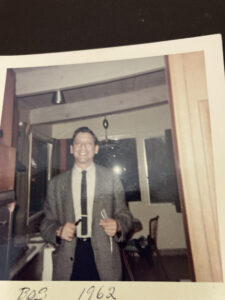
Bob Kent, 1962, Mill Valley
Bob said he had wanted to join the Haganah. But for some reason that never happened. He did, however, serve during World War II and Korea. Bob was an artist and one of the first gringos to head down to San Miguel de Allende, Mexico — around 1949. San Miguel was an artists’ colony packed with former GIs. Then Bob taught art at Tamalpais High School (Mill Valley, California) in the 1950s and early 1960s. He said he saw Kesey in the Haight but never saw Kerouac in North Beach.
In his youth, Bob was a bit of a brawler and had a broken nose to prove it. He said he had regularly crashed Jewish weddings at the Cleveland Jewish Center on East 105th Street and the Temple on the Heights on Mayfield Road. High-class shuls. Bob grew up in Kinsman — working class. He married my mother’s sister Celeste Zalk, also of Kinsman.
Bob got a PhD while teaching high school in California and wound up as an art-education professor at the University of Georgia. Athens — in the mid-1960s — was no San Francisco, but it was a job. Bob was adept at slinging the prof lingo: “existential,” “seminal,” and “cognitive.”
Bob changed his last name from Katz to Kent. I don’t know when. I think my father had something to do with the name change. Speaking of Kent, I knew a Winston who had previously been a Weinstein. Are there other Jews named after ciggies? Old Gold? (Herb Gold.) I miss cigarettes — the names. Tareyton, Benson & Hedges.
This isn’t the whole story of Bob. Bob’s children — my first cousins — know more, and they ain’t going to tell it!
May 1, 2024 3 Comments



